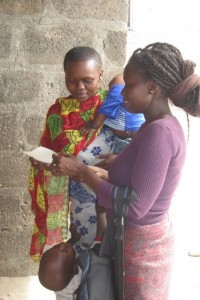Dar es Salaam, TZ – Starting Birth Registration at a second house – 30 Jun 2013
During the months of May and June we were able to continue the birth registrations with the parents at the house of Mama Asha, but we also introduced the project to a new house, Mama Ramadhani’s house.
The reason we started to introduce the project at a new house, before all the children at the house of Mama Asha had received their birth certificates, is because several applications for a birth certificate were in research at different RITA (Registration, Insolvency and Trusteeship Agency) offices. This research can take one or two weeks, or sometimes longer. We also have experienced in the past that paperwork can be lost at RITA and we have to start the whole process again. So, to wait until every child has a birth certificate at one house could take several months. The time we lose is not always because of slow administration services. Sometimes parents need to prepare / acquire certain documents for an application for a birth certificate to be made. For example, one girl at the house of Mama Asha had no documentation, so we needed a letter signed and stamped by her school headmaster. We feel that an important part of the process should be the responsibility of the parents to obtain the letter from the school. The letter is prepared in advance for the parents to present at school. Sometimes this happens quickly, sometimes not. Sometimes the parents have to wait for school to reopen, or the headmaster to return from a conference, and sometimes the parents take several weeks to return to collect the letter. All these small delays can add up to cause some birth registrations to take a long time.
We choose to introduce the project at the house of Mama Ramadhani because another mother, who had participated in the project previously, introduced us one day by taking ATD team members to meet Mama Ramadhani. We were immediately struck that this was a house where many extremely poor families were living. There were many small children, and we discovered two who were of school age but were not attending school. (In such a case, we have offered to accompany the parents to a school where the children can be written into the register. Having a birth certificate is part of the necessary paperwork for a child to have a place at school.)
We also learnt at Mama Ramadhani’s house that nearly all the parents were illiterate, needing assistance to fill the form for registration of birth. Also, even though many of the children were very young, nearly all had no documentation from birth. In Tanzania, children under age five can have free medical treatment. This is provided when the mother produces a clinic card. One mother has two children, aged 18 months and 4 years, who did not have clinic cards, a document that can be used to register births. However, we were more concerned that the children were not going regularly to the local clinic for check-ups. The first thing we did was to accompany this mother to go to the local hospital where she was able to register the children and obtain clinic cards, and at the same time have both children checked for good health. For the children aged 5, 6 and 7, it was necessary to have their applications for birth signed and stamped by the local Street Government officer.
The team felt at Mama Ramadhani’s house we had discovered families really living in extreme poverty; not understanding and accessing their basic rights; children at risk of poor health or not attending school; many adults are illiterate, really the people the project is aiming to reach.
The process of introducing the project at Mama Ramadhani’s house and preparing the files, and trying to conclude more difficult cases at Mama Asha’s house, meant the numbers of applications for birth certificates slowed down. During May and June parents applied for nine birth certificates and four birth certificates were given. The total number of children with a birth certificate is now eleven.



